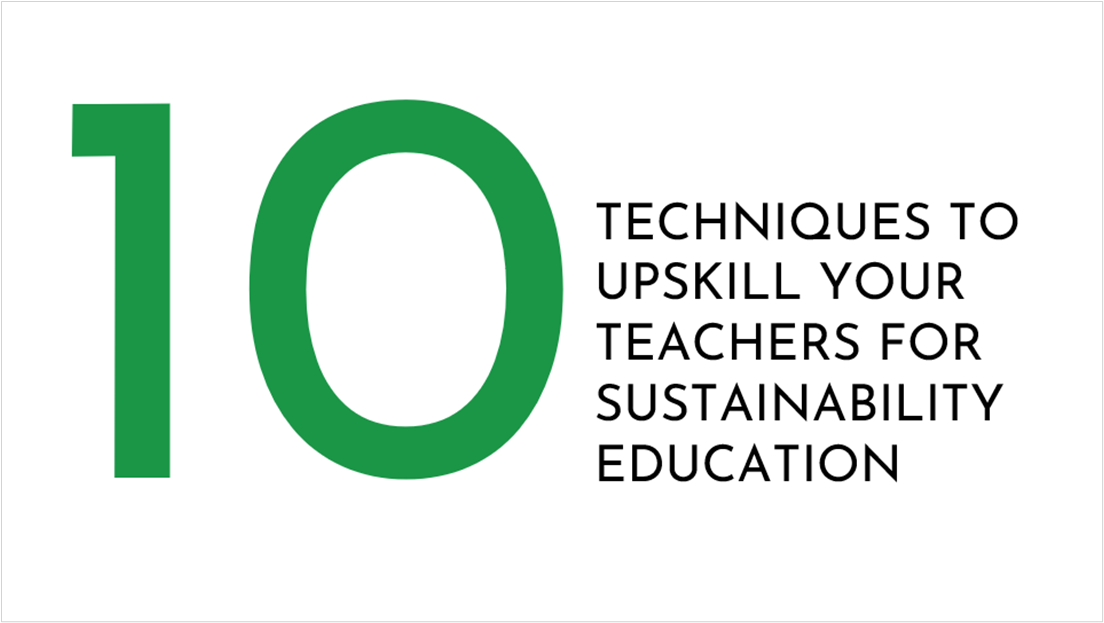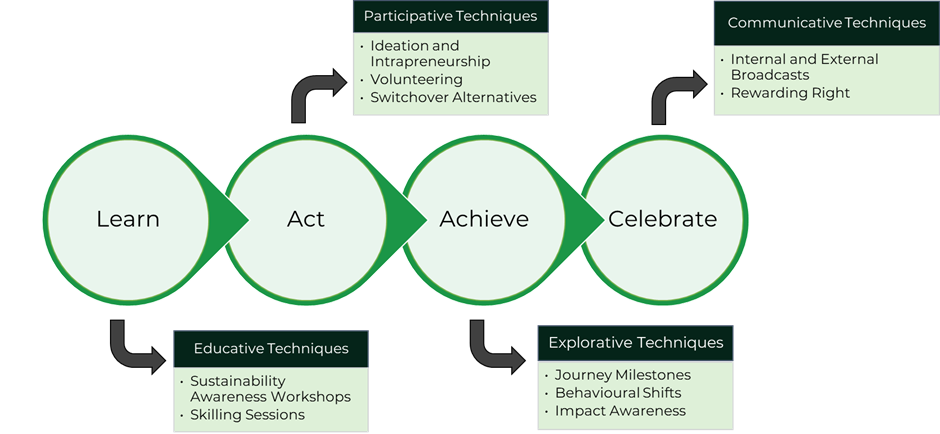
The schools of today are consciously upgrading and rewriting their syllabus and educational structure to keep up with the evolving requirements of today’s children. Students’ evolving minds require constant nurturing and tools to help them develop into well-equipped adults, confident and informed enough to take on any problems that may come their way.
Teachers must also constantly stay on top of the school’s and the student’s requirements to impart the best possible Sustainability education to students. It is a known fact that teachers have a very important role to play in delivering an effective learning experience for the students. The profile of the new-age teacher is holistic, and goes beyond pure subject expertise. NEP 2020 expects the teaching community to impart Life skills and Learning skills, apart from Literacy skills – together, they constitute 21st century skills.
Taking a cue from this ever-evolving expectations from teachers, we have lined up 10 techniques to upskill your teachers, while imparting Sustainability Education to your students. These techniques have been categorized based on a typical human’s learning journey on any new subject, i.e Learn-Act-Achieve-Celebrate.

1. Educative Techniques
Sustainability Awareness Workshops
Conduct interactive, fun demo sessions for the teachers, explaining various aspects of sustainability – composting, gardening, health hacks, kitchen hacks, travel hacks etc. It is important for them to understand the various facets of sustainability themselves and start practicing/exploring some of them first-hand.
Skilling Sessions
Teachers have a strong sense of understanding of what works best for their students. On a new subject like sustainability, they would need to appropriately reskill or upskill themselves. Schools should facilitate such learning programs to help them be effective mentors. These sessions should consider equipping teachers with the right tools, content for effective delivery of sustainability education to their students.
2. Participative Techniques
Ideation and Intrapreneurship
As mentioned earlier, teacher’s have the best pulse of every student and every batch. They have better understanding of what would best suit their students. For a novel concept like sustainability, it would be appropriate to engage teachers in the design of the right pedagogy for students. This should be done using novel methods like Design Thinking to evolve ideas that are student-centric.
Volunteering
Every human learns best when he/she puts the lessons learnt to practice. Teachers should be provided opportunities to volunteer in campus-wide initiatives for green projects. They should be encouraged to participate in them and have a first-hand exposure to various real implementations like rainwater harvesting, solar energy production, organic gardening, composting etc.
Switchover alternatives
Encourage teachers to identify and use eco-friendly alternatives during their work at school, wherever possible. Switching over to eco-friendly options may seem tough to begin with but these are beneficial in the longer run. This need not be only at school but could be from their life outside school too. As an example, teachers may consider going plastic-free at their homes and this would find its way into how they manage waste within the school premises too.
3. Explorative Techniques
Journey Milestones
Human behaviour is driven by the encouragement they receive for their daily actions. Along the sustainability journey of the teachers, the school authorities should create opportunities for recognizing milestones. As mentioned earlier, Sustainability journey is a long one but with milestones along the journey, one feels encouraged to keep going.
Behavioural Shifts
Teachers should be encouraged to go for behavioural shifts, not just at school. This could be at their homes or within their communities. Providing appropriate guidance on how to transition in a planned and phased manner will help them adopt behavioural changes with ease. It is important to enable this journey for them so that there are no reasons for giving up along the way.
Impact Awareness
It is important to provide teachers ample avenues to understand the impact of their individual sustainability actions. At the same time, they need to be educated about the impact of the sustainability initiatives within their school premises. It is only when they are aware of the impact that these individual and institutional changes are bringing about, will they be able to instruct their students appropriately on Sustainability.
4. Communicative Techniques
Internal and External Broadcasts
It is important to publish the results of the sustainability journeys taken up by the teachers for the broader audience – students, school management, parents and relevant authorities too. Such communications will encourage the teachers to stay on the pursuit for sustainability education. These broadcasts can happen on the school’s website, newsletters, official social media channels etc.
Rewarding Right
Exceptional performances by teachers who have continuously traversed their sustainability journeys need to be identified. Such top performers need to be rewarded for their exceptional commitment. They have prepared themselves in the best possible manner to impart sustainability education further, and this will benefit the school and students immensely.
A balanced mix of these techniques should be ideally used by school authorities to equip their teachers to deliver 21st century skills. This will further result in effective and efficient delivery of holistic education to the young learners.
